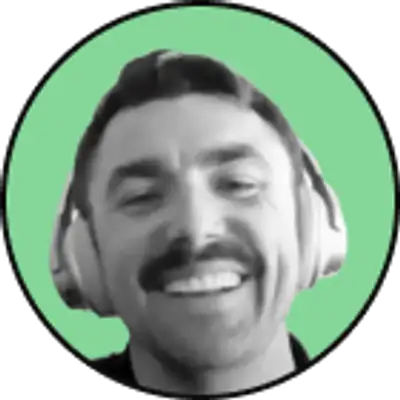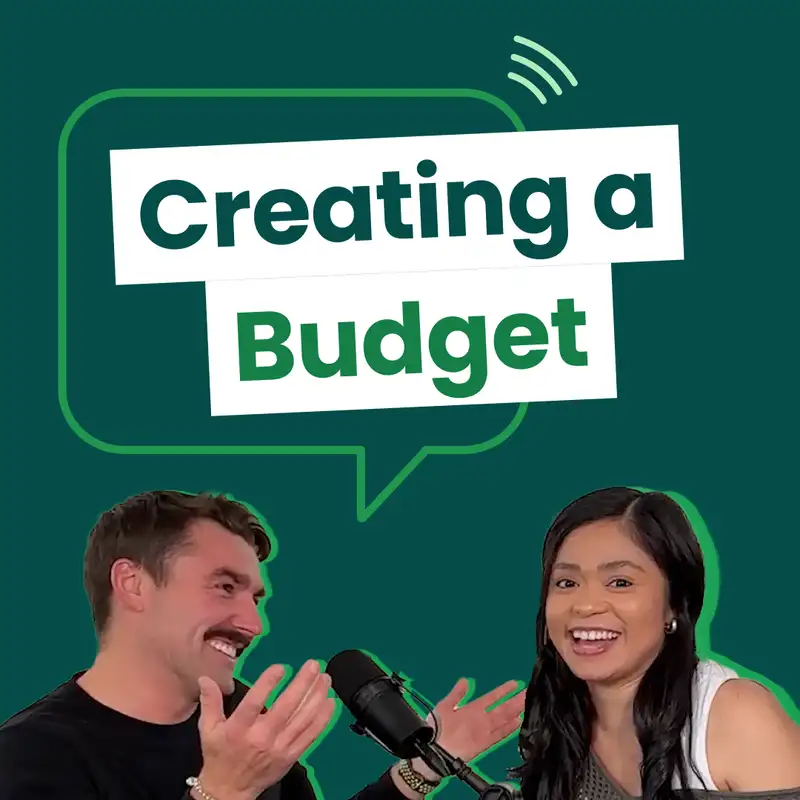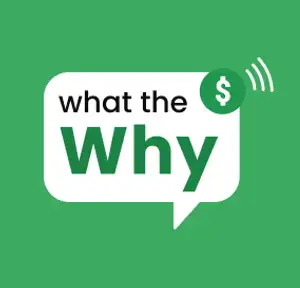What the Why: The why behind your financial decisions and the importance of understanding personal finances.
GBR Helpdesk (00:00.078)
this our first podcast. You're right. I know. Hey, hey, welcome. Welcome. Hey guys, I'm Ceci. Hey, I'm Bryson. And this is What the Why? Why? Why? Why? Why? Why? Why are we doing this? I think the whole podcast and the reason that we decided to do this was to answer that why. Yes, exactly. But it was it was the why behind finances. Right. Like, why are we talking about finances? And why? Why?
are you choosing to do certain things in your life? With your finances. With your finances. What is the why behind your financial decisions? So I think that's the why behind what the why. For all of our new subscribers, new followers, people first time here. Welcome. We're here to explain at a very normal level. Basically, we're not professionals. This is an investment advice. We're just everyday workers trying to explain the why behind.
to your financial goals. Exactly. I think it's great that we're getting together to talk about this because it's such an important topic that people don't talk about enough. No, it's very taboo. And I think that's like a great segue into the first segment, which is how we got to where we are. Because it wasn't just an overnight thing. And in no way or form, like, is anybody set up that way? Like, you're not just like brought out of the box, like ready to just like take on the world with your finances with some manual. Like, you don't get that. And I think I think it's really interesting.
You know, because we talked about this on Zoom before we got on this and kind of got, you know, our stuff together to understand how we're going to do this. But you brought up some really interesting points. You know, I grew up in the U .S. I grew up kind of starting middle class. And, you know, when I grew up, financial conversations weren't really a thing. You know, I understood, OK, you're going to grow up, you're going to go to school.
you're gonna get a job, you're gonna save money, and then you'll eventually retire. But all of the, the - If you follow the steps. Yeah, if you follow the steps. Whatever the steps are. And that's exactly why we're here. And honestly, where I got to this point is, you know, in public school, there wasn't a financial class. And, and with my parents that were full time working nine to five, how they save their money, why they earn the income that they did, how they spent it. And - It's all experimental, I think.
GBR Helpdesk (02:21.166)
It's so different to each situation. And I think every parent has their own way of managing finances. I don't blame them for not sitting down, shout out to your parents for raising such a stand up young man. But at the same time, it's okay. They didn't know. It's okay. You don't have to know everything. Figure it out along the way. I think that's actually a great takeaway to start this off is us coming from two different worlds, we're here now, but everyone has a different financial journey, financial goal that they have. That could be...
I want to take care of my family. I want to buy a house, take care of my kids. I want to live on a... Off the grid. Yeah, I want to live off the grid on a shack in the beach. Exactly. Like that's very Gen Z by the way. Gen Z, follow us. That's going to be the next podcast. Yes. How to live off of the grid with only a hundred dollars. But yeah. That's great. I'm glad that you had like that journey. But I think like the journey that you had as like you were growing up and part and part of that was like figuring out on your own and like understanding like how you...
navigate finances without like that influence. Like because I think finances are such a personal thing too. Like it's kind of just like the way that you understand your body, right? You also understand your finances the same way. Like that's, I think a good analogy. I love that. There's physical health and there's financial health and no two people are the same. And you're not going to understand someone else's financial health because you don't know everyone, your other person's situation. Look at our parents and what's...
progress over the last few years with the pandemic and inflation. They were making half of what we make and being able to afford a house, afford all these things. So it's hard for them to have that be subject matter expert without you doing your own research and coming from a state, I'm originally from Arizona, which unfortunately is one of the lowest ranking states when it comes to education. So it might be different in other places. I think there's 20 - Is that a real stat? That's a real stat. There's 20 states in the US.
link below on our site that actually breaks this down where financial planning classes are required. Arizona was not one of them. I didn't know that. Yeah, it's pretty crazy. I think actually where you're residing out, Atlanta, Georgia, shout out East Coast, is actually one of those that require it. But, you know, coming from that - Well, that's great that I moved there then. When I decide to have children, if I do, then they can go - Push them right into that financial class. So, okay, so enough about me.
GBR Helpdesk (04:45.454)
Sassy, I feel like I fit into a very common denominator of I grew up middle class. I love that it's relatable. I think that regardless if you're a man or woman, just like an American growing up in the 90s, I'm sure a lot of people can relate and say like no one got traditional finance. Yeah, there wasn't really that conversation with family. You kind of learned it yourself and then you realize kind of the steps that you need to take to get to what you want to do. And I think the primary takeaway for everyone listening for me is not so much,
the steps to get there, start with the end in mind. What is your goal? And the goal is obviously gonna change, whether you're in your teens, obviously in high school, probably not very charismatic, not really thinking about it, then college, then work, and life, but think about what those goals are. That would be my personal takeaway. And that's your why. Yeah, and that's my why. And that's my why in this podcast, is I found the end first, identified those goals, and put steps in place.
which we will talk about in a later segment on this podcast. Finance is Unpacked, some of the ways that I was able to go about this. But again, enough about me, I'm already getting annoyed with my own voice. Ceci, I really wanna know, obviously we talked about it, but our new followers, our new subscribers, they haven't heard that story and I'd love for you to just break it down for us, DJ. Yeah, yeah, yeah, because that's unique.
Yeah, you're right. You're right. It is unique. But you know what? At the same time, I think that it's still very relatable. The reason why I work so hard and like why I'm so invested in my finances is just because of like my immigration journey. Like I'm not from the United States. Like I've been living here for 33. How old am I? 34 years now. And where wait real quick for the audience. Where were you from? Filipino. Philippines. Manila. Holler at all my Filipinos. Shout out. Yes.
Thank you for supporting. And I think that's a great segue into finances unpacked, specifically some of the things that I realized in my financial journey and actually what Ceci and I were talking about off the pod about kind of ways to better set yourself up for success in finances. And I think one of the biggest ones for me, the biggest X as the Gen Z crowd likes to say, is purchasing.
GBR Helpdesk (07:07.182)
irrelevant stuff crap shit whatever words we're gonna use. Why are we buying all these things? Yeah so okay so what's your what's your what's your guilt purchase that that you still do to this day because everyone has that. Dude freaking food yeah if you look at my like bank statements you'll be like dang Sassy spends a lot of money on food. Okay do you do you do you have a budget? Yes. Okay so you stick you still you still you spend frivolously within a budget okay okay so but the budget is extreme if you looked at
the way that we, like I spend money on food, you'd be like, that could be like someone's rent. On food, but it's probably good food. yeah. But okay, okay. I eat good. So, since we're talking about finances unpacked and you know, how we're going about our financial life, I think this is an awesome point to bring up. So, Ceci, we were talking offline and you were kind of talking about how you look at your day -to -day purchases. And one of the things that you kind of mentioned just now,
is budgeting. But you know what? One thing I do do is that I make sure that we only spend a certain amount in a certain category. So like for example, I know this sounds crazy, but because I love food so much, we spend $300 a week on groceries every week. $1200, $1200 a month on groceries. But what you just said... Did I say $300 a week? $300 a week on groceries. $300 a week? Yeah, that's $1200. Yeah. Yeah. Yeah. Yeah. Okay. Yeah.
But like if we go past that then it's like bad job, but that is budgeting I mean, that's exactly what you even though you're you're saying your priority. yeah is food is life food healthy healthy food healthy food makes you think straight. Mm -hmm helps you Do everything well, I think that's one of the things that growing girls the why behind your finances you have to justify To yourself you don't need to prove anyone else you need to prove here on the podcast that I'm I'm doing it because it's healthy but
You just brought up a great point. Just like financial health, you're prioritizing your physical health, which naturally helps you in a financial hub. It helps you think smarter and it helps me grow boss. Yeah. And I think that's, that's a great, another takeaway as we're getting into finances, unpacked, no matter your situation, no matter what your end goal is, say it with me. Create a bus. That's okay. That's actually perfect. We were on the same. I would do, I didn't pick up.
GBR Helpdesk (09:36.11)
what you're putting down. No, no, no, no, no. I like the energy, so that's perfect. That's perfect. Create a budget. Create a budget. That's a really good takeaway. Yes. I'm trying again. I mean, no matter. And we have. It might sound elementary. We have a link. We have a link. Yes. There's a bunch of links on our page. Make sure you click on them. There's a link there that actually has a downloadable file that has a budget sheet on our site. Take it. Make it your own. Link in bio. Everyone's unique.
So make a budget, make a budget, look at your, what you're spending your money on and make a budget. Yeah. When I did my budget, we spent about.
900 a month. So I mean, it's pretty close to yours. Like groceries are expensive. They're so expensive. And do you shop at like the big four? TJ's, Trader Joe's, Costco. Yeah, we go every Sunday. That's our jam. Trader Joe's. We go every Sunday. Well, every other Sunday, because that was actually a budget hack. We're so aligned. Because I noticed when we went every Sunday. And this is something actually that you should - But we don't go every Sunday to Costco. No, no, no. We go once a month to Costco. Yes. Once a month to Costco. We buy the basics there. We were going to Trader Joe's.
every Sunday and what we started realizing was it started adding up to like $200 a week plus Costco and it was because we were buying kind of all these extra things, you know, you get hungry, you're like, that'd be good snack this week. So we started going every other week. That's smart. And we cut our grocery bill in half for the month. I see. That's a pretty good life hack. So that's just to put, so like when you are saving that money, are you putting it away for something else? Yes. Yes. And I think, I think we don't, we don't care.
No, but I bought I bought out on groceries. I love groceries. And now for our first our first and favorite segment. I love this. I love this. Broke Ask questions where we answer your questions that you submit. What's this first question, Bryce? Am I answering it? You're you're answering it. Thomas came in and asked my living expenses for listening. Are more than 50 percent of my income. Am I screwed? my gosh.
GBR Helpdesk (11:41.294)
Thomas, you are not screwed. I think that there are a lot of Americans who are living like this. People are not living within their means. You are not screwed. You just need to understand what you're spending your money on. That would be my best advice. So is there anything that he should change to his, or is it just really understanding where that money's coming from and where it's going? I think that's the first thing that he should do, is just understanding where that money is going. Yeah.
I like that idea. It's as simple as that. I think starting from there, you're not screwed. You just need to have more understanding of like where that money is going. At one point, Thomas, my rent was 70 % of my income and I'm still here. And that's, that's a real stat. Okay. That's that hurt. It hurt me living on ramen. no. Yes. Understand where your money's coming from and where it's going. Yes. Because even if you're spending more than 50 % on your rent, maybe you're spending another 30 or 40 % on going out.
Wait, was that the question? I'm spending it on rent? I'm spending 50 % of my income on living expenses. So that could be a lot of things. That's, yeah. I mean, like, that's not an issue, is it? No, I think the budget. I think back to that, budget. I don't think it's an issue. Where your money's coming from, where it's going. Because if you're spending 60%, 50 % or more, but you're still budgeting and being able to save, exactly. That's fine. Yeah.
Don't berate yourself over finances. I think that's the first thing. Like don't think that that's a bad thing. No, everyone is different. Don't put yourself into the brackets. The moment that you put yourself into that mindset that I'm so bad with money, I suck at this. That's when you'll start failing. Yep. Trish, message us. Trish like fish. Trish, Trish like fish. Still me. Each month I use my whole paycheck. What do I do? So Trish,
I don't think it's bad that you're using your whole paycheck per month. I don't know what that means. Like I think you would have to be more specific with how you are using that paycheck. If you're saying I'm using my whole paycheck to buy jelly beans or meat or $20 chicken Wagyu beef at Costco, then I would be concerned. But if you're saying that you're using it for certain things, you have a budget, then great. Like keep doing that if it's working for you.
GBR Helpdesk (13:57.614)
Keep at it. Yeah. Is that enough? No, I like that. Budget. I could say more. It comes back to budget, guys. Just where your paycheck's going. This is our first episode. And for all you still sticking around or found us on Reels or TikTok, make sure subscribe and follow. This is just the beginning of really digging into that why. And we've had some really enriching conversations today. And I think it's been great to just talk about finances in general. I encourage everybody to do the same. Talk about it with your friends. It doesn't have to be.
hey, I'm earning X amount and tell me how much you're earning. But it could be as simple as like, what did you buy this week? Like why, why did you buy that? And I think those, that kind of starts the primary takeaways from this episode. One, there's no equal situation. No. Everyone's finances are different. Everyone starts from somewhere. Just like our bodies. All of our bodies are, it's a science. You want to have financial health just like you have physical health.
and no two people are the same. I think that's the first takeaway. No one's the same, figure it out for yourself. We're all starting from different levels of playing field. Find out where you are now and find out where you want to be. I think that's the huge takeaway. Everyone's different from where you are now. Everyone's different from their goals. And it's okay to be middle class. I want to buy more chocolate, you want to buy more meat. We have the same goals, just a little different. We want to ball out. And I think that's the second takeaway. Budget. In order to find out where you are and where you want to be, you need to create a budget. Again, link below.
We have a link to our site. There is a budget tracker that you can download, customize it to yourself. There's actually an app that I use also that I can call out. It's called Oops. Check out Oops. I love using that app. And since we're different, I use Rocket Money. So there's two options. There's two options. Sponsor Rocket Money. We've got a budget tracker. We've got Oops. We've got Rocket Money. So no one's the same. Budget. And when it comes to budgeting, right?
Just again, everyone's different. Mine, I already told you is different from this. Ceci's is different from this. Think about how that budget is broken down and kind of think about that 50, 30, 20 rule. 50 % for needs, rent, mortgage, car payment, electricity, phone. 30 % for once, your fund money. You're going out a night on the town. 20 % savings. And that 20 % savings can mean so many different things, but I think the biggest takeaway is emergency fund.
GBR Helpdesk (16:23.054)
investing. Yes, there is that fun money, but I think that falls into the 30 % category. Do investment like a different segment on investing because I think that's like a that's such a huge other. There's so many things you can invest in. But I think the biggest takeaway on that is you still want to have some investment no matter how early you can start how much you're investing could be $1 here $1 there. Yes, make make your money work for you.
Creators and Guests



